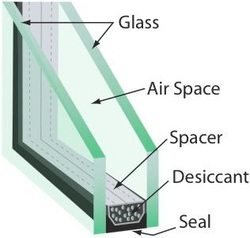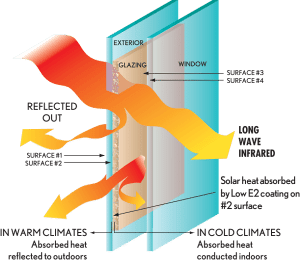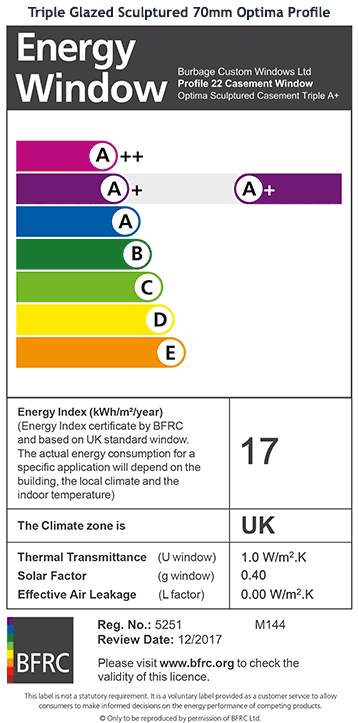Door Features
Glass Options
Double & Triple Glazing Options
Single, Double Or Triple Glazing?
Depending on the application you have in mind, we offer several glazing options.
Single Safety Toughened Glass is suitable for internal applications where sound and thermal insulation is not required. Most suited to our InternaFold and Bi Fold Servery range.
Double Glazed IGU’s are the preferred and most popoular choice for most other applications. Our StockFold, CustomFold and Straight Sliding Door & Window systems all come will Double Glazing as standard.
If Thermal Efficiency is your primary concern then Triple Glazing is a good option. The double thermal bridge inside the glass increases the overall U value and slows heat loss compared to double glazed units. Thicker doors and sashes are required to use triple glazing.
What Type of Glass?
Apart from the construction of the unit / paynes there are several options regarding the type of glass used.
We use Pilkington glass on our standard units and Planitherm glass on our Integrated Blind IGU’s.
Both have similar ranges providing options to suit specific requirements.
Glass Technology Includes:
Self Cleaning Glass
Solar Control Glass
Energy Efficient Glass
Thermal Glass
Noise Control Glass
Click Here To Find Out More About These Options
The Overall U Value of the IGU is affected also by the desiccant seal and the gas that fills the cavity. As standard we use a warm edge spacer bar which increases the thermal efficiency of the unit compared to other spacer bars.
Thermal Bridge Cavity
Several options are available for the thermal bridge cavity between the paynes of glass. Each option results in a different U value of the IGU’s
Air filled IGU’s are the cheapest option but don’t neccessarily meet U Values required by Part L Building Regulations and are therefore normally suited to internal doors and windows.
Argon filled IGU’s are the next option and will meet U Values required by Part L Building Regulations if used with Low e glass.
Krypton and Xenon filled IGU’s are the most expensive option and surpass Argon in regards to the U Values achieved.
See Here for more information on Gas specifications



Single, Double & Triple Glazing Options
Safety Toughened & Laminated Options
Energy Efficient, Self Cleaning, Solar Control Options
Argon, Krypton Or Air Filled Cavity
Glass Technology Options
Self Cleaning Glass
Self-cleaning glass is exactly as the name suggests – glass that keeps itself clean. It uses an organic process by the special coating whereby dirt is broken down by UV rays and is then washed away by rain.
Long thought as an impossible dream, self-cleaning glass is now a reality. After years of research and development Pilkington introduced the Pilkington Activ™ range of products – the world’s first self-cleaning glass.
The range is environmentally friendly and very easy to maintain. It has products which combine both self-cleaning and solar control properties, making them highly desirable amongst home-owners looking for the ultimate in glass solutions.
reference : https://www.pilkington.com/en-gb/uk/householders/types-of-glass/self-cleaning-glass
Energy Efficient Glass - Low Emmisivity
Energy-efficient glazing is the term used to describe the double glazing or triple glazing use in modern windows in homes. Unlike the original single glazing or old double glazing, energy-efficent glazing incorporates coated (low-emissivity) glass to prevent heat escaping through the windows. This makes the windows highly thermally insulating hence improving the energy efficiency of your home and helping to save money on your heating bills.
Low-emissivity glass (or low-e glass as it is commonly referred to) is a type of energy-efficient glass designed to prevent heat escaping through your windows to the cold outdoors. Low-e glass such as Pilkington K Glass™ has an invisible coating which dramatically reduces heat transfer and reflects interior heat back into your room.
reference : https://www.pilkington.com/en-gb/uk/householders/types-of-glass/energy-efficient-glass
Solar Control
In hot climates, solar control glass can be used to minimise solar heat gain and help control glare. In temperate regions, it can be used to balance solar control with high levels of natural light.
Solar control glass can be specified for any situation where excessive solar heat gain is likely to be an issue.
All products are available in toughened or laminated form for safety and security requirements, and can be combined with other benefits such as noise control.
reference : https://www.pilkington.com/en-gb/uk/products/product-categories/solar-control
Decorative Glass
Decorative glass is very versatile; it allows total freedom in design and can be customised to fulfil any requirements. Various technologies can be used to create the finished products, whether it is patterned or coloured glass. We can also influence the transparency of the glass surface, as well as its light transmittance (i.e. to be translucent).
We can match existing decoratie glazing so your new windows and doors fit in with your decor
Noise Control
No matter where it originates, from railways, aircraft or factories, noise is all around. Future trend research suggests that traffic and noise in general will only get worse.
The careful and considered selection of glass can be crucial in helping to reduce noise level and meet noise requirements.
The highest noise insulation is achieved using an acoustic laminated glass.
Glass controls noise by:
- Reflecting the noise back towards the source, and
- Absorbing the noise energy within the glass.
We can improve the sound insulation of glass in different ways – increasing the thickness of the pane, using laminated glass on its own or within an Insulating Glass Unit (IGU) – the larger the gap between the panes, the better the insulation.
The best performance is however obtained when using an acoustic laminated glass such as Pilkington Optiphon™, and for the highest noise insulation, within an IGU, Pilkington Insulight™ Phon.
Thermal Bridge Cavity Gas Options
Air Filled IGU's
The physical properties of the dehydrated air used in the cavity, means that it transmits (ie loses) less heat by convection or conduction than normal air. This is because the molecules of dehydrated air are relatively immobile, and therefore have a ‘lower thermal conductivity’. The same physical properties of dehydrated air also give it lower acoustic conductivity, for improved sound insulation.
But window energy efficiency can be further increased by substituting dehydrated air with an inert gas, such as argon, xenon or krypton within the unit.
With Part L Building Regulations requiring ever lowering U Values, Argon gas is thw minimal required.
Argon Filled IGU's
IGU energy efficiency can be further increased by substituting air with an inert gas, such as argon, xenon or krypton within the unit. Argon, which has 34% lower thermal conductivity than air, is the most commonly used. Although argon-filled units cost around 5% more than air-filled units, they can improve a double glazing window’s U value or energy rating by over 30%. Argon fillings should last the lifetime of a double glazing window and over a period of 25 years should not lose more than 5%.
Krypton Filled IGU's
Krypton and Xenon are even more energy efficient than Argon but are seldom used in double glazing window as they are more expensive.
The use of these is rare and only viable when there is no other option.
Order Your Bi Folding Doors & Windows Today
